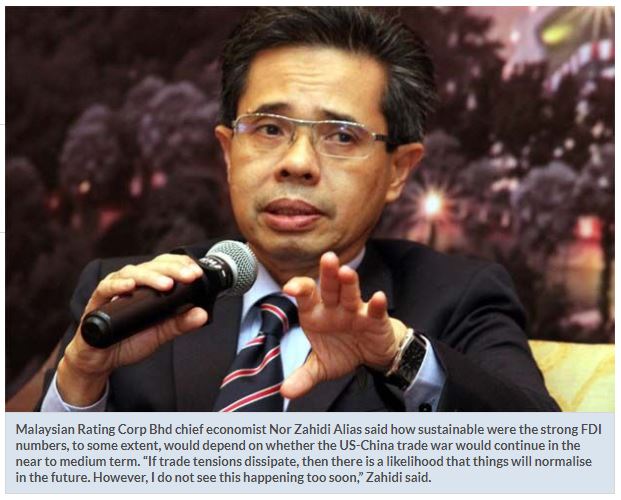Trade War bane for FDI inflows into Malaysia
PETALING JAYA: The outlook on foreign direct investment (FDI) inflows for Malaysia has been weakened due to the rising trade tensions between China and the United States.
According to several economists, although Malaysia had registered a 73.4% jump in approved FDI in the first quarter of the year, the unresolved trade tensions between the two largest economies in the world could weigh on the outlook, as it had created a highly uncertain environment for businesses, and that would eventually affect their final investment decisions.
“It is hard to project whether we could continue to see strong FDI numbers in the coming quarters because no one knows how the US-China trade war, which is affecting investment decisions, will pan out,” said BIMB Securities Research economist Imran Nurginias Ibrahim.
Malaysian Rating Corp Bhd chief economist Nor Zahidi Alias concurred, saying that how sustainable were the strong FDI numbers, to some extent, would depend on whether the US-China trade war would continue in the near to medium term.
“If trade tensions dissipate, then there is a likelihood that things will normalise in the future. However, I do not see this happening too soon,” Zahidi said.
“There are also indications that global investors are aggressively seeking new markets to diversify their investments regardless of the trade war. This will help them mitigate business risks,” he added.
Data released by the Malaysian Investment Development Authority on June 10 showed “approved” FDI for all sectors in Malaysia rose 73.4% to RM29.3bil in the first quarter of this year, compared with RM16.9bil in the corresponding quarter last year.
The surge in approved FDI during the quarter in review was driven by a 127% jump in investments into the manufacturing sector, totalling RM20.2bil, compared to RM8.9bil a year ago.
Finance Minister Lim Guan Eng had then said the increased FDI figures were in line with the trade and investment diversion due to the US-China trade war, which had benefited Malaysia.
Zahidi pointed out that Malaysia was not the only country that would benefit from the trade diversion.
Other Asian countries such as Vietnam, Thailand and Indonesia had also become investors’ favourite destinations.
“In the medium and long term, Malaysia’s attractiveness as an investment destination will depend on its overall competitiveness. For instance, Malaysia will have to continue to improve its ease of doing business to lure more foreign investors.
“Further improvement in government effectiveness (commonly measured by Worldwide Governance Indicators) will also help to induce more FDI inflows,” Zahidi explained.
Meanwhile, Imran stressed it might be too early to celebrate the strong numbers for “approved” FDIs in recent quarters.
“Firstly, approved FDIs do not necessarily translate into actual investments by foreign companies, and secondly, it may take time to realise the FDI,” he said.
Similarly, one economist with a local bank said it was difficult to quantify the impact of the approved FDIs on the country’s economy, because those were not actual investments.
“Of course, strong FDI numbers would benefit the country’s economy in the long run – not only due to the investments itself but also the spillover effects – but this is only true if it is ‘realised FDI’ if the ‘approved’ FDIs did not translate into actual investments, I don’t see how much the economy can benefit from it,” said the economist, who requested anonymity, citing company’s policy.
Separately, economist Jomo Kwame Sundaram on Monday said Malaysia should not be too reliant on FDIs to boost growth. The senior adviser at Khazanah Research Institute said the government should instead focus on strengthening domestic investments to promote a more sustainable growth trend for the country.
Lim had earlier noted that the positive impact from the US-China trade war was only a temporary for Malaysia.
He noted if the trade war were prolonged, Malaysia would ultimately be affected by the global economic slowdown.
“Malaysia is reaping benefits from business relocation as well as trade and investment diversions caused by the trade war between China and the United States. As a result, FDI into Malaysia has increased drastically,” Lim said.
“But, again, let me caution that a trade war benefits nobody. There are no winners, only losers,” he added.
Source: https://www.thestar.com.my/business/business-news/2019/06/19/trade-war-bane-for-fdi-inflows/#Ahb5eJaDXZ4OzX9H.99


 English
English




